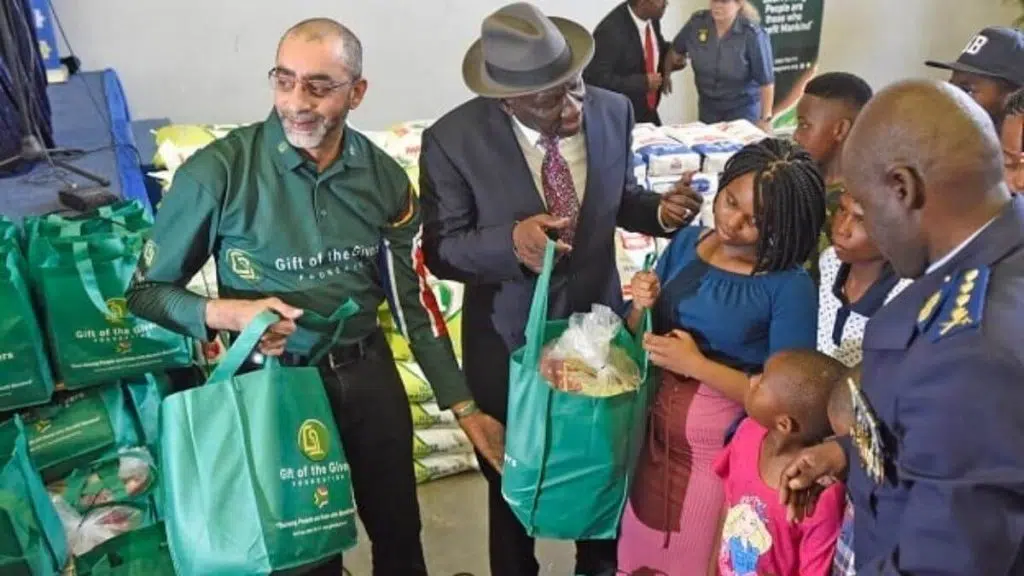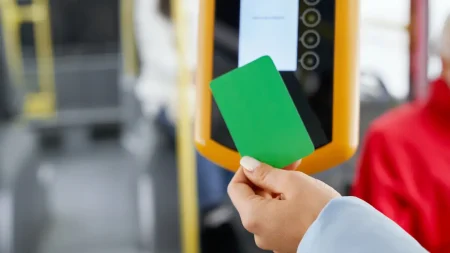Placing food on the table has become a daily struggle for many South Africans. Families are still on the verge of extinction due to rising food costs, increasing unemployment, and the aftereffects of fires, floods, and droughts. One organisation, the Gift of the Givers Foundation, stands out in the midst of this escalating catastrophe for its efficiency, compassion, and honesty.
Since its founding in 1992, this indigenous humanitarian group has evolved to represent optimism both inside and outside of Africa. The organisation is still working to make sure that no one goes hungry in November 2025, even as millions fight food insecurity.
About Gift of the Givers
Mission and Credibility
The Gift of the Givers Foundation, founded by Dr Imtiaz Sooliman in 1992, is recognised as Africa’s largest disaster-response non-governmental organisation of African origin. Its mission is simple yet profound: to restore hope and dignity to the vulnerable through rapid, unconditional humanitarian action.
Operating in more than 45 countries, including extensive programmes across South Africa, Gift of the Givers has delivered over R6 billion (approximately US $319 million) worth of aid in its 32-year history. What distinguishes the organisation is its commitment to serving humanity without discrimination — regardless of race, religion, or background.
Their approach is rooted in compassion and action. When disaster strikes, Gift of the Givers is usually among the first to arrive and often the last to leave. From earthquakes and floods to pandemics and poverty relief, they have proven time and again that South Africans can lead in global humanitarian work.
November 2025 Food Parcel Programme
What the Programme Offers
Food parcels from Gift of the Givers are designed to do more than feed people for a few days — they offer nourishment, relief, and a renewed sense of dignity. Each parcel typically includes nutritious staples such as:
- Maize meal and rice
- Cooking oil and salt
- Long-life milk
- Canned foods and tinned fish
- Tea, sugar, and biscuits for children
During emergencies or festive periods, additional items — like beans, lentils, or protein supplements — may be included. The foundation also provides Sibusiso Ready, a world-first high-energy peanut-and-soya supplement developed locally to combat child malnutrition and stunting.
In 2020, at the height of the COVID-19 lockdown, the organisation distributed 200 000 parcels nationwide, reaching a record 100 000 parcels in just one week to prevent starvation that threatened to become deadlier than the virus itself.
More recently, in 2025, they have continued emergency food drives in areas hit by floods in the North West Province and shack fires across informal settlements.
Areas Covered and Beneficiaries
As of October 2025, monthly distributions continue across all nine provinces. While a nationwide November-specific event has not been formally announced, the organisation operates on a year-round schedule, ramping up whenever demand spikes — for example, during winter, Ramadan, or in disaster zones such as Gelukspan and KwaZulu-Natal.
Their target beneficiaries include:
- Child-headed households
- Widows and single parents
- The elderly and disabled
- Disaster-affected families
- Isolated rural communities
All distributions are completely free, with no application fees and no hidden charges. Gift of the Givers repeatedly emphasises that it never charges beneficiaries, and warns the public to report anyone asking for money.
Who Is Eligible?
Eligibility Criteria
Gift of the Givers determines eligibility based on vulnerability, not paperwork or income brackets. You qualify if:
- You or your household lack consistent access to food.
- You belong to a high-need group such as the elderly, disabled, child-headed household, single parent, or disaster victim.
- You reside in an area where the foundation or its partners are currently distributing aid.
Because the foundation works closely with community leaders and welfare offices, much of the verification happens locally to prevent duplicate collections and to prioritise the most urgent cases.
Documentation and Preparation
You may be asked to provide:
- A South African ID or birth certificate.
- Proof of residence or community address.
- Basic information about household size and income status.
- In some cases, a referral from a community leader or social worker.
Tips for First-Time Applicants
- Act early. Demand increases toward the end of the month.
- Be honest. Clear information helps teams prioritise urgent cases.
- Use official channels. Do not rely on social media posts or unverified messages claiming to represent Gift of the Givers.
- Stay reachable. Provide a working phone number or WhatsApp so staff can confirm details.
How to Apply or Access Food Parcels
Follow these steps to secure assistance in November 2025.
Step 1: Contact the Emergency Hotline
Call the toll-free number 0800 786 911 (available 24 hours a day).
Explain your situation and mention if you fall into a priority category such as elderly, disabled, or disaster-affected. The hotline team will advise on the nearest distribution point or organise home delivery for those who are house-bound or in remote areas.
Step 2: Reach Out via Email or Website
Send an email to info@giftofthegivers.org or visit giftofthegivers.org.
Go to the “Hunger Alleviation” or “Make a Difference” sections and submit a request with the following details:
- Your full name and contact number
- Province and town / village location
- Number of people in your household
- A brief description of your circumstances
Responses are typically prompt — within hours for urgent cases.
Step 3: Connect Through Local Partners
If you don’t have internet access, approach your:
- Ward councillor or social development office
- Local church, mosque, or community centre
- School or NGO representative
These partners often submit lists of beneficiaries to Gift of the Givers and help coordinate pickup points. In Cape Town and Durban, for example, municipal offices and community halls frequently host collection days.
Step 4: Monitor for November Updates
Stay informed about pop-up drives and special events via official channels:
- X (Twitter): @GiftoftheGivers for real-time announcements.
- Facebook: Search “Gift of the Givers” for community posts and photos.
- Website News: giftofthegivers.org/news for provincial schedules.
If you’re a student, contact your university’s Student Affairs Office. Several institutions partner with Gift of the Givers to run on-campus feeding schemes (e.g., University of the Free State, Durban University of Technology).
Step 5: Collect Your Parcel
Once you’re approved, attend the designated collection venue. Bring your ID and confirmation SMS or letter. Arrive early to avoid long queues. Volunteers will verify your details and issue the parcel — each valued at about R350, funded entirely by donations.
Important Tips and Advice
What to Bring
- South African ID or proof of residence
- Confirmation message (if applicable)
- A sturdy bag or trolley for carrying items
- Mask or sanitiser for health precautions
Safety and Health Precautions
- Always collect from verified points with visible Gift of the Givers branding.
- Do not hand over cash to any individual claiming to speed up the process.
- If you receive damaged goods or suspect tampering, report it to the hotline immediately.
- Store dry goods in cool, clean areas once home.
How to Verify Legitimacy
- Check the official website and social media for your venue details.
- Call 0800 786 911 to confirm the event is genuine.
- Look for volunteers wearing official logos and ID tags.
- Remember: all food parcels are free. If anyone asks for payment or personal banking details, it’s a scam.
Avoiding Disappointment
- Register early in the month.
- Keep communication open with local leaders.
- If you miss a collection, ask about the next scheduled distribution.
- Share verified information only from official Gift of the Givers channels.
Other Resources for Food Aid in South Africa
While Gift of the Givers is one of the most trusted names in humanitarian relief, several other organisations also offer free meals or food parcels:
- FoodForward SA – Operates food banks and community feeding schemes nationwide. foodforwardsa.org
- Operation Hunger – Runs nutrition programmes and community gardens in rural areas. operationhunger.org.za
- SA Harvest – Rescues surplus food from retailers and redistributes it to the hungry. saharvest.org
- Community and Faith-Based Organisations – Churches, mosques, and temples regularly run soup kitchens and holiday meal programmes.
- University Feeding Schemes – Many tertiary institutions have campus food banks for students facing hunger.
Exploring multiple options can increase your chances of receiving support during difficult months.
Read more: How to Find Legitimate Food Banks and Avoid Scam Operations in South Africa
Frequently Asked Questions (FAQs)
1. Can I apply for Gift of the Givers food parcels on behalf of someone else?
Yes. You can request aid on behalf of another person or family if they are unable to contact the organisation themselves — for example, if they are elderly, ill, or live in a remote area. When applying, provide their full details, location, and reason for assistance, along with your contact information as a reference.
2. How long does it take to receive a food parcel after applying?
Response time varies depending on location and current demand. In urban areas, distribution can occur within 3–7 days after verification, while in rural or disaster-affected regions, it may take up to two weeks. Urgent cases, such as families with no food at all, are prioritised and handled faster.
3. How often can I receive food parcels from Gift of the Givers?
The foundation typically assists households once per month to ensure fair distribution across communities. However, during emergencies or ongoing hardship, local coordinators may allow follow-up assistance if additional parcels are available. Always check with your regional partner or hotline for updates.
4. What if I don’t have a South African ID or official documentation?
You can still apply. Gift of the Givers often assists people without formal documentation — such as migrants, refugees, or homeless individuals — through community verification. Provide alternative identification (e.g., asylum papers or school letters) or contact a local social worker or religious leader to confirm your situation.
5. Are there specific collection points for each province?
Yes. Each province has designated distribution points managed by local partners. Common venues include municipal halls, schools, churches, and community centres. To find your nearest point, call 0800 786 911 or check the latest schedule on giftofthegivers.org/news.
6. Can Gift of the Givers deliver food parcels directly to my home?
In cases where beneficiaries are elderly, disabled, or living in inaccessible rural areas, home deliveries may be arranged through local volunteers or partner NGOs. Mention your circumstances when applying so that logistics can be coordinated appropriately.
7. Are the food parcels suitable for people with dietary restrictions?
Most parcels contain standard non-perishable staples. If you or a family member has allergies, diabetes, or other health conditions, notify the team during your application. While specialised packs are not guaranteed, coordinators may adjust contents or recommend alternative support options such as ready-to-eat meals or Sibusiso supplements.
8. Can I volunteer to help distribute food parcels in my community?
Absolutely. Gift of the Givers welcomes volunteers, especially during large-scale drives. Interested individuals can sign up via the “Volunteer” section on their website or email info@giftofthegivers.org. Volunteers assist with packaging, registration, logistics, and community outreach.
9. How do I report fake messages or people pretending to represent Gift of the Givers?
Scammers sometimes use fake social-media pages or WhatsApp messages to trick people into paying for aid. If you suspect fraud, do not share personal details or pay money. Immediately report the incident to 0800 786 911 or info@giftofthegivers.org, and block or flag the account. Genuine representatives will never ask for payment — all Gift of the Givers services are 100% free.
10. What should I do if my community is not yet covered by the programme?
If your area does not currently have a distribution point, contact the hotline or email the foundation with your community details. Gift of the Givers continuously expands its coverage based on need. You can also gather interest from local leaders to form a new beneficiary list — the more verified requests received from your area, the greater the chance of inclusion in upcoming rounds.
As South Africans prepare for the year-end pressures of November 2025, the Gift of the Givers Foundation remains a pillar of hope and humanity. Their work proves that compassion is not a theory but an action — a parcel delivered to a hungry child, a meal shared with a family in crisis.










